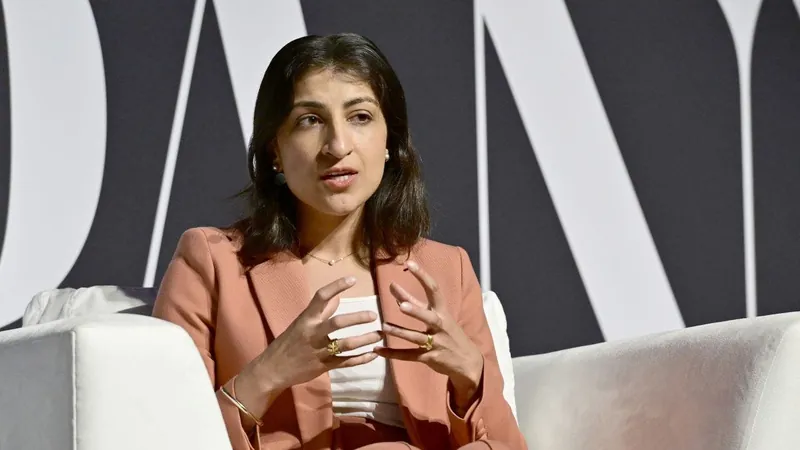
FTC Chair Lina Khan Offers Bold Defense of Merger Crackdown Amid Inflation Crisis
2024-09-23
FTC Chair Lina Khan Addresses Corporate Monopolization and Inflation Concerns
In a revealing interview with CBS News' '60 Minutes,' Federal Trade Commission (FTC) Chair Lina Khan addressed the growing concern over corporate monopolization and its impact on inflation. Khan emphasized that an alarming concentration of corporate power is contributing to price hikes and market manipulation, suggesting that consumers are often left vulnerable to exploitation.
Discussion With Lesley Stahl
Khan's statements were made during a segment hosted by Lesley Stahl, where they discussed a recent town hall meeting attended by Khan and Congresswoman Alexandria Ocasio-Cortez, D-N.Y. 'Too often, fewer companies are controlling more of the market, leading to price hikes and potential exploitation of consumers,' Khan remarked.
Inflation and Corporate Profits
The discussion turned to the ongoing issue of inflation, catalyzed by the pandemic and geopolitical conflicts, which have strained supply chains. However, Khan pointed out a disturbing trend: even as supply chain issues ease, prices remain stubbornly high. She highlighted a perplexing phenomenon where some corporate executives have openly celebrated inflation as beneficial for their profits during earnings calls.
Regulatory Oversight on Mergers and Acquisitions
Responding to concerns over proposed mergers and acquisitions, Khan argued that regulatory oversight is crucial to maintaining market competitiveness. 'Even if a merger creates efficiencies that could lower prices, if there's a lack of competition, companies may have little incentive to pass those savings onto consumers,' she warned.
Impact of FTC's Merger Scrutiny
Stahl raised important points about the FTC's sometimes chilling effect on proposed mergers, which can lead companies to abandon such deals when under scrutiny. 'Sometimes companies decide to abandon the merger,' Khan confirmed, asserting that this reflects a necessary restraint on corporate power.
Ensuring Market Competitiveness
As the FTC continues to tackle high-profile mergers, including the highly debated Kroger-Albertsons deal, Khan stressed the importance of maintaining a competitive marketplace. She noted that only about 2% or 3% of proposed deals are investigated rigorously by the FTC and the Department of Justice together, emphasizing a careful and moderate approach.
Balancing Regulatory Power and Corporate Conduct
When questioned about the potential risks of wielding extensive regulatory power, Khan acknowledged the concern but emphasized the dangers posed by unregulated corporate behavior. 'We must worry about destabilization if companies believe they are above the law and can engage in reckless practices without accountability,' she stated.
FTC's Legal Challenges and Political Pressures
The FTC currently faces legal challenges alleging that its regulatory efforts overstep established boundaries. Khan indicated that it’s essential for the agency to exercise the authority granted by Congress, rather than retreating in the face of opposition.
Khan's Dedication Amid Political Tensions
As political tensions rise, including calls from influential donors for Vice President Kamala Harris to terminate Khan's role should she be re-elected, the FTC chair remains steadfast. 'My focus is on the work at hand, not on external pressures from CEOs or their commentary,' Khan affirmed, reinforcing her dedication to the vital mission of the FTC.
Conclusion: A Critical Junction for Corporate Oversight
Khan’s advocacy for stricter oversight highlights the intersection of corporate power and consumer protection—an issue that continues to generate heated debate in American politics and economy. As inflation concerns persist, the questions of regulatory authority versus corporate freedom remain more relevant than ever.



 Brasil (PT)
Brasil (PT)
 Canada (EN)
Canada (EN)
 Chile (ES)
Chile (ES)
 España (ES)
España (ES)
 France (FR)
France (FR)
 Hong Kong (EN)
Hong Kong (EN)
 Italia (IT)
Italia (IT)
 日本 (JA)
日本 (JA)
 Magyarország (HU)
Magyarország (HU)
 Norge (NO)
Norge (NO)
 Polska (PL)
Polska (PL)
 Schweiz (DE)
Schweiz (DE)
 Singapore (EN)
Singapore (EN)
 Sverige (SV)
Sverige (SV)
 Suomi (FI)
Suomi (FI)
 Türkiye (TR)
Türkiye (TR)